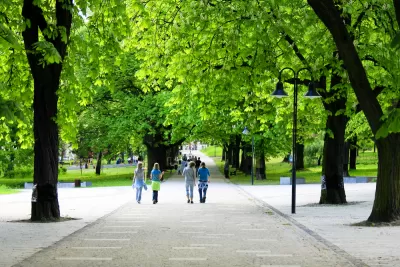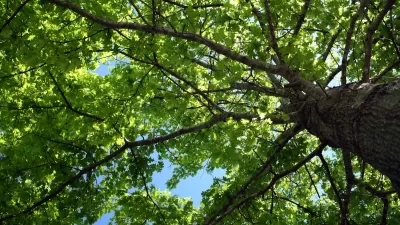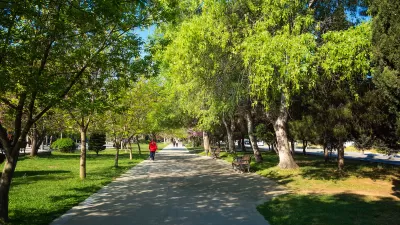Ambitious campaigns to plant trees in urban areas often don't take into account the complexities of growing and maintaining effective urban forests.

Around the world, pledges to plant more trees in cities have taken off as a perceived "feel-good cure-all for global warming. In the U.S., conservative leaders like former President Donald Trump have touted tree-planting while working to eliminate emissions regulations." But the reality of planting trees is more complicated, write Feargus O'Sullivan and Linda Poon.
"Popular campaigns to plant 1 million trees are announced to much fanfare in cities from London to Los Angeles to Phoenix, Arizona, but often fall short of their goals. Many trees don’t survive, or thrive, or deliver their promised benefits." Although "[t]here is good reason for the enthusiasm around planting trees," including carbon storage and their ability to mitigate the effects of urban heat islands and pollution, "planting a massive number of trees is not necessarily a positive investment if not enough of them survive to become mature plants." Tree planting also comes with its own carbon cost, "meaning that trees have to survive years before they offset that cost. The largest environmental gain comes when trees mature, sometimes decades after they’re planted."
The article details the lackluster performances of programs in Copenhagen and Los Angeles, where tree planting efforts ran up against a variety of unexpected challenges. According to U.S. Forest Service researcher Lara Roman,"[i]t’s not just about planting a million trees. It’s about planting and taking care of a million, and in the right places." For example, "non-native species can be the best choices in cities, where intense human activity has to an extent estranged climates from their broader surroundings."
"That’s why if cities really want to measure the success of their tree programs, they need to factor in the maturity and types of trees" by measuring tree canopy and planting diverse, resilient species.
FULL STORY: The Darker Side of Tree-Planting Pledges

Alabama: Trump Terminates Settlements for Black Communities Harmed By Raw Sewage
Trump deemed the landmark civil rights agreement “illegal DEI and environmental justice policy.”

Planetizen Federal Action Tracker
A weekly monitor of how Trump’s orders and actions are impacting planners and planning in America.

How Atlanta Built 7,000 Housing Units in 3 Years
The city’s comprehensive, neighborhood-focused housing strategy focuses on identifying properties and land that can be repurposed for housing and encouraging development in underserved neighborhoods.

In Both Crashes and Crime, Public Transportation is Far Safer than Driving
Contrary to popular assumptions, public transportation has far lower crash and crime rates than automobile travel. For safer communities, improve and encourage transit travel.

Report: Zoning Reforms Should Complement Nashville’s Ambitious Transit Plan
Without reform, restrictive zoning codes will limit the impact of the city’s planned transit expansion and could exclude some of the residents who depend on transit the most.

Judge Orders Release of Frozen IRA, IIJA Funding
The decision is a victory for environmental groups who charged that freezing funds for critical infrastructure and disaster response programs caused “real and irreparable harm” to communities.
Urban Design for Planners 1: Software Tools
This six-course series explores essential urban design concepts using open source software and equips planners with the tools they need to participate fully in the urban design process.
Planning for Universal Design
Learn the tools for implementing Universal Design in planning regulations.
Jessamine County Fiscal Court
Caltrans
Institute for Housing and Urban Development Studies (IHS)
City of Grandview
Harvard GSD Executive Education
Toledo-Lucas County Plan Commissions
Salt Lake City
NYU Wagner Graduate School of Public Service





























